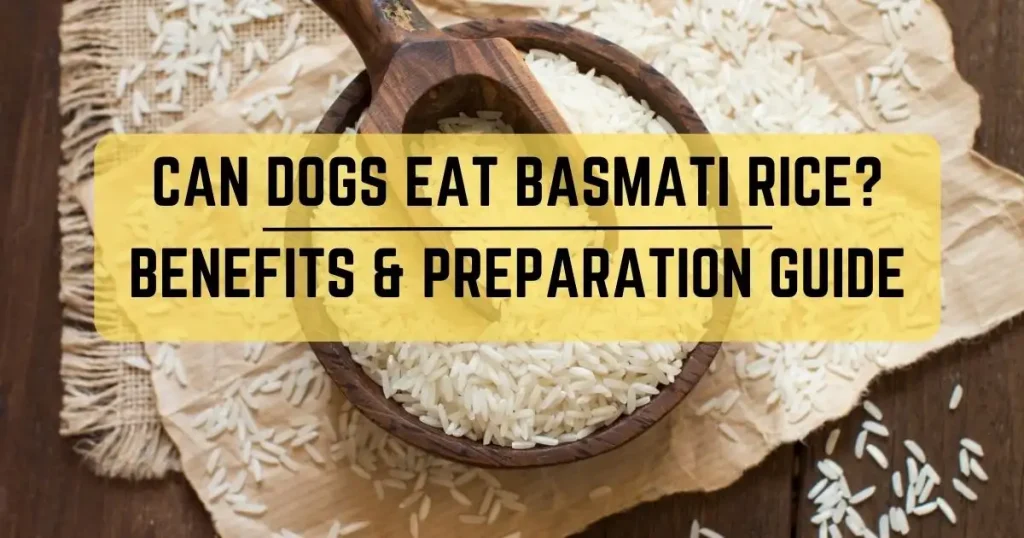
Are you wondering if it’s safe to feed your dog Basmati rice? The answer to this canine culinary conundrum lies in the physiology of your furry friend’s digestive system.
As a writer who adores dogs, you understand the urgency of providing your pet with the best nutrition possible. But before you give your dog that bowl of Basmati goodness, let’s dive into the details. This article explores the benefits that make Basmati rice an intriguing option for your dog, along with how to properly prepare it, all while keeping those commercial dog food options in mind.
So, let’s embark on this flavorful journey to discover whether Basmati rice is a savory delight for your beloved canine companion.
Can Dogs Eat Basmati Rice?
Yes, dogs can eat Basmati rice. It’s generally safe for them when served in moderation and properly cooked. Basmati rice offers a source of energy and is easy on a dog’s digestive system, making it a suitable addition to their diet.
Benefits of Basmati Rice for Dogs
Basmati rice offers several benefits for dogs, making it a valuable addition to their diet. Here are some of the advantages of feeding your furry friend basmati rice:
- Source of Energy: Basmati rice is a good source of carbohydrates, providing your dog with a steady supply of energy. This can be particularly beneficial for active dogs or those with high energy levels.
- Easy to Digest: Basmati rice is easy for dog to digest. Its long grains are gentle on the stomach, making it a suitable choice for dogs with sensitive tummies or those recovering from digestive issues.
- Rich in Vitamins and Minerals: This type of rice contains essential vitamins and minerals that contribute to your dog’s overall health. It can complement their regular dog food by providing additional nutrients.
- Blood Sugar Regulation: Basmati rice has a low glycemic index, which means it helps regulate blood sugar levels. This can be advantageous for dogs with diabetes or those prone to blood sugar spikes.
How to Cook Basmati Rice For Dogs?
Cooking basmati rice for your dog is a straightforward process. Here’s a step-by-step guide:
- Rinse the Rice: Start by rinsing the basmati rice thoroughly under cold water to remove excess starch. This helps prevent the rice from becoming too sticky.
- Use the Right Ratio: For every cup of basmati rice, add two cups of water. This ratio ensures the rice cooks to the desired consistency.
- Boil and Simmer: Place the rinsed rice and water in a pot and bring it to a boil. Once boiling, reduce the heat to a simmer, cover the pot, and let it cook for about 15-20 minutes, or until the rice is tender and the water is absorbed.
- Cool and Serve: Allow the cooked rice to cool before serving it to your dog. Make sure it’s at a comfortable temperature to prevent any burns or discomfort.
How to Feed Dogs Basmati Rice?
When feeding your dog basmati rice, remember to introduce it gradually to their diet, especially if they haven’t had it before. Start by mixing a small portion of cooked basmati rice with their regular dog food. Gradually increase the amount of rice while decreasing their regular food until they are comfortable with the transition.
How Much Basmati Rice Can I Give My Dog?
For most dogs, a small serving of basmati rice as an occasional treat or addition to their regular diet is safe. Typically, a quarter to a half cup of cooked basmati rice per day for a medium-sized dog should suffice without causing any issues.
Remember that rice should complement their primary dog food, not replace it entirely, to maintain a balanced diet.
Can My Dog Have Basmati Rice For Diarrhea?
Yes, basmati rice can be given to your dog if they have diarrhea. It’s a bland and easily digestible option that can help soothe their upset stomach. Start with small portions and monitor their condition. If diarrhea persists or worsens, consult your veterinarian.
How Much Basmati Rice For Dog Diarrhea?
For dog diarrhea, you can give them small amounts of basmati rice. Start with around a quarter cup for small dogs and half a cup for larger breeds. Monitor their response, and if diarrhea persists, seek advice from your vet to adjust the portion size accordingly.
Other Types Of Rice Good For Dogs
Apart from basmati rice, there are other rice varieties that can be beneficial for dogs:
- Brown Rice: Brown rice is rich in fiber and nutrients, making it a healthy choice for dogs. It can aid in digestion and provide a good source of energy.
- White Rice: White rice is easy to digest and can be helpful in soothing upset stomachs or diarrhea in dogs.
- Wild Rice: Wild rice is a good source of protein and essential minerals, adding nutritional value to your dog’s diet.
- Jasmine Rice: Jasmine rice is another option that dogs may enjoy. It’s aromatic and can be mixed with other foods for variety.
Final Thoughts
In conclusion, basmati rice is a great option to include in your dog’s diet, offering numerous benefits in terms of energy, digestion, and nutrition. Remember to cook it properly, introduce it gradually, and ensure it complements their regular dog food.
Additionally, you can explore other rice varieties to keep your dog’s diet interesting and nutritious. Always consult with your veterinarian if you have concerns about your dog’s diet or any specific health conditions they may have.
Frequently Asked Questions
Why is Basmati Rice Good For Dogs?
Basmati rice is good for dogs because it provides a steady source of energy due to its carbohydrates, making it suitable for active pets. It’s easy to digest, gentle on sensitive stomachs, and can help regulate blood sugar levels, benefiting dogs with diabetes or prone to blood sugar spikes.
Is Basmati Rice Good For My Dog?
Yes, basmati rice can be good for your dog. It’s a nutritious source of energy and is generally easy on their digestion. However, always serve it in moderation and ensure it complements their regular dog food for a balanced diet.
Is Basmati Rice Healthier Than Jasmine Rice?
No, basmati rice is not necessarily healthier than jasmine rice for dogs. Both types of rice can be suitable options, but the choice depends on your dog’s preferences and any specific dietary needs or sensitivities they may have.
Is Plain Basmati Rice Ok For Dogs?
Yes, plain basmati rice is generally safe for dogs. It’s a long-grain rice variety that’s easy to digest and can provide a source of energy. However, it should be fed in moderation and introduced gradually into their diet to avoid gastrointestinal upset.
Can Dogs Eat Basmati Rice For Upset Stomach?
Yes, dogs can eat Basmati rice for an upset stomach. Basmati rice is gentle on their digestive system and can help alleviate discomfort associated with stomach issues. It’s important to ensure the rice is plain and properly cooked, free from any seasonings or additives that may be harmful to dogs.
Can Dogs Eat Basmati Rice When Sick?
Yes, dogs can eat basmati rice when they are sick. It’s easily digestible and can provide a bland, comforting option for dogs experiencing gastrointestinal distress. However, it’s important to consult with a veterinarian for guidance when your dog is ill.
Can Puppies Eat Basmati Rice?
Yes, puppies can eat basmati rice in moderation. Basmati rice is generally safe for them and can be a part of their balanced diet. However, it’s important to ensure that the rice is cooked properly and introduced gradually into their meals.









